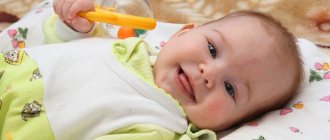All parents, without exception, wait for the moment when the child begins to say mom and dad. Many people think that children's speech begins to develop on the day the baby pronounces the first word. In fact, for this to happen, we need long-term preparation of the articulation organs, their coordinated work, the ability to switch, mobility of the lower jaw, lips, tongue, and soft palate. It is impossible to pronounce exactly those sounds that make up the first words if the child does not know how to distinguish them from phonemes that sound similar, for example, words such as cat-whale, slide-crust and others.
More precisely, human speech is formed during the prenatal period, when the organs of hearing, articulation and brain structures are formed. These processes are influenced by heredity, illnesses suffered by the mother, the presence or absence of bad habits, and the lifestyle of the baby’s parents. The course of labor and the state of health of the baby are important factors in his successful debut as a speaking and thinking person.
We will tell you at what age children begin to speak their first sounds, what this depends on, at what age children begin to speak in sentences, and how to help them go through each stage of speech development in a timely manner.
Speech in the first weeks and months of life
Immediately after birth, intensive development of brain structures begins, and new connections between neurons are established. At the same time, the organs of hearing and articulation develop, and physical and phonemic hearing is formed. Without proper hearing, children cannot master speech, since distortion or absence of sound signals entering the brain makes it impossible to develop speech skills.
In the first weeks and months of life, it is the speech of others that stimulates the initial stage of speech development. The baby listens to the speech of loved ones, he calms down for a while when he hears his mother’s voice, the impulsive movements of his arms and legs stop for a while. After some more time, he begins to turn his head towards the source of the sound.
Not all mothers and fathers talk to newborns and infants in the first months of life. They think this is unnecessary, because the baby doesn’t understand anything yet. Such one-sided “conversations” between parents and children, which accompany their bathing and waking, develop auditory concentration and the desire to respond. Attentive parents may notice how the child tries to move his lips, as if he wants to say something. It’s even better if parents often call the baby by name, show him toys, call the child, not moving much away from the crib.
This is the age at which a child begins to speak vowels and consonants. Up to 3 months, the child pronounces the following sounds:
- vowels – A, U, E;
- consonants – M, K, X, P, B, G.
These phonemes still sound unclear and are pronounced involuntarily. These skills mark the first stage of speech development – humming. In addition, the cry of a 1–3 month old baby is quite expressive. By intonation, the mother can determine whether the baby is bored, wants to eat, or it’s time to change wet diapers, that is, he has begun to master intonation.
Causes of delay in the development of the speech apparatus
Soon the long-awaited moment comes when the child begins to understand speech. Parents are obliged to take part in every possible way in the development of the baby’s speech apparatus, adhering to a simple rule: constantly talk to the baby from the first months, and be sure to pronounce the words correctly. Babysitting will most likely slow down the development of the speech apparatus and is quite capable of causing problems with speech in the future. However, all children learn to speak at different speeds. Most often, girls begin to speak earlier than boys.
Often inexperienced parents try to determine at what age the child begins to understand words and try to pronounce them. If a child does not begin to speak at the age of 2.5 years, then there is a need to consult a specialist. However, you should not go to extremes. There is no need to demand too much from the baby; it is necessary to take into account his development and age. At the same time, it is unacceptable to ignore the existing problem, because developmental delays are easier to correct at the initial stage. Speech delays are quite common and can be due to the following reasons:
- Heredity. Probably, mom or dad started talking at a late age, and the child inherited this feature.
- Problems with hearing or speech apparatus. Most likely, these organs are not developed enough. Only doctors can determine this more precisely.
- Neurological disorders caused by hypoxia during childbirth or illness.
- There is little or no dialogue with the child.
- Active child. He is in a hurry to explore the world, his physical development is higher than his speech.
- Tensions between parents. Children subtly perceive the atmosphere in the family, which affects their development.
The sooner the doctor understands the exact cause of delays in speech development, the faster he will help get rid of them. Treatment will help the child quickly catch up and speak correctly. By the time he goes to school, the baby will not be different from other children.
From humming to babbling
At the beginning of the fourth month, the baby begins to look for an adult, smiles, and begins to intensively move his arms and legs (revitalization complex). He begins to emit drawn-out and melodious combinations of sounds - he cooes, saying a-a, a-gu, a-ha. Some sounds are simply impossible to reproduce; such phonemes do not exist in the Russian language.
After another 2–3 months, the turn of babbling comes. At first these are individual syllables pa, ka, na, ma, which a little later become similar to the peculiar words pa-pa-pa, ka-ka-ka, na-na-na. Most often, babbling appears when the baby is full, has slept and is in a good mood. This is not yet a speech, but preparation for it, a kind of preparatory exercise.
Although he does not speak yet, he understands a lot - he turns his head when he is shown a familiar toy, a bird, a cat. Children 6-7 months old fulfill simple requests - give a pen, play palms, and this is also a step towards speech development.
How to stimulate babbling
From 6 months, children are able to move in space - sit and crawl. Their perception improves, they can repeat sounds after adults. This skill can be developed - as soon as the child pronounces the syllables, the parents repeat them after him. This technique develops hearing, articulation organs, speech exhalation, and encourages the baby to pronounce these syllables again and again. Such mini-lessons are carried out with a cheerful, well-fed and healthy baby. If he is cold, hungry, or unwell, verbal games with his parents will not do any good.
It’s good if the child sees the face of the one who is talking to him, then he will be able to repeat the movements of his mother or father’s lips. In order for sounds to be heard clearly, you need to ensure complete silence - turn off the music, mute the sound of the TV.
You can play “hide and seek” by covering the baby’s face with a diaper and saying “peek-a-boo.” Showing adults objects of the environment develops passive vocabulary well. In this case, you need to clearly name them, accompanied by a pointing gesture. Soon the child will find them with his eyes, reacting to the adult’s question “Where is the watch?”, “Where is the cat?”, “Where is the car?”
The baby is trying to say: how to behave?
The first time conscious words are heard from a baby is from 8 to 12 months. This is usually the period when the child begins to understand adults. He tries to turn to mom or dad, and sometimes asks for an item. Parents, as a rule, are incredibly happy, believing that their child is finally starting to speak. However, statistics show that speaking words for a long time does not carry any semantic meaning.
When do the first words and phrases appear?
It is impossible to name the exact date at which children begin to speak their first words. They can appear at 8–9 months and at 1 year 2 months. And all this is the norm. According to the observations of parents and teachers, girls usually start talking earlier than boys, although there are exceptions. At the turn between the first and second years, the baby’s vocabulary contains from 2 to 20 words. Usually this:
- simplified words (ma-ma, pa-pa, la-la, ki-sa, am-am);
- onomatopoeia (beep, peek-a-boo, peep-peep).
It is at this age that the child speaks to his mother. Why do children pronounce words in their native language? Because the adults around him single out from the baby’s babbling syllables and sound combinations that are inherent specifically in their language system, and repeat only them. Therefore, the period of babbling is important for the development of children's speech.
At one and a half years or a little later, the baby begins to combine words into sentences, as long as they consist of two words. The words in them are not consistent, an example of the following phrase: “Give me a doll” (give me a doll), “Papa is not there” (dad is not at home). But this is the age when attentive mothers notice that their baby begins to speak in sentences.
Speech development
At what age should children start talking? If a child does not want to speak at two years old, should we sound the alarm?
Nowadays children begin to speak later than their peers 15-20 years ago. This is due to the environment, the peculiarities of the mother’s pregnancy and complications during childbirth. Out of 10 children who speak well for their age, 2-3 people, the rest with various speech delays.
By the age of two, a child should have the simplest two-word phrases: mommy give, mommy go, who came, etc. Boys begin to speak later than girls, closer to 2.5 to 3 years. If by the age of three a child speaks literally 10-15 words and does not connect words into phrases, this is already a delay.
Who should a mother turn to first if something in her speech development worries her?
Each child has an attending physician who monitors him from birth, sees how he develops, when he begins to hold his head, roll over, etc. If a child does everything with a delay, if something went wrong during pregnancy and childbirth, there will most likely be problems with speech development. Usually a pediatrician or neurologist refers you to a speech therapist. Good results are obtained precisely with an integrated approach to the problem. A neurologist may prescribe medications, examinations, and may need to do an encephalogram of the brain, Doppler of the cervical spine. The speech therapist will recommend special exercises, gymnastics, and speech therapy massage.
What should parents do to ensure that their child does not have speech problems?
Our speech zones are at our fingertips; there are simple exercises that any mother can do: roll a small massage ball with pimples over the child’s palm while reciting a rhyme or nursery rhyme. Particular attention should be paid to the fingertips.
Fine motor skills are closely related to speech. Modeling, playing with plasticine and grains, when the grains are pressed into the plasticine pattern with your fingers, help very well. By doing finger exercises every day, massaging the fingers, the mother helps the child prepare for the first words. If parents want their child to speak without problems, they must work with him even at an age when, it would seem, the first meaningful words are still far away.
It is also worth paying attention to the development of phonemic hearing. Phonemes are words that are similar in sound, for example: rat-roof. The development of phonemic hearing in young children is very important for the formation of speech in the future, for the prevention of dysgraphia at school. There is a simple way to develop phonemic awareness. You can pour various cereals into empty bottles or jars, such as baby yoghurts: peas, semolina, rice. If you shake these jars, they will sound different. With your child, you can guess which cereal is which by changing jars and increasing their number. With older children, you can play repeating similar sounds: za-za-sa, za-sa-za, ka-ga-ga, vo-go-vo, etc.
What other exercises are useful?
Very good exercises for forming speech exhalation. The task is to teach the child to blow and exhale correctly. Foil turntables are well suited for this; they need to be made to spin by blowing soap bubbles on them, or gurgling through a straw in a glass of water.
In order for the child to learn not to “swallow” sounds, not to rush, and to pronounce the word completely, there is an exercise with clapping his hands. The mother claps her hands for each syllable, and the child repeats the words after her, dividing them into syllables by clapping. No matter how old the child is, the child should normally pronounce so many syllables. For example, at two years old: ma-ma, pa-pa, etc. At three years old, words of three syllables: so-ba-ka, kon-fe-ta.
And of course you need to read aloud a lot and talk to your child. First, the passive vocabulary accumulates, the words that the child hears and understands, and then the active vocabulary, the words that the child pronounces.
If a child at 5 years old cannot pronounce the letter R, what should he do?
First, whistling sounds appear, then hissing sounds; the “difficult letters” R and L usually appear by the age of 4-5 years. You need to start producing the sound R with a growl, when you are training just one sound R-R-R-R-R. Then a vowel is added to form a syllable, for example, RA, RU. Then the reverse syllable AR, UR. You need to repeat these exercises often, every day; this is not an easy job to do together with your child. It’s good when parents manage to conduct it in the form of a game.
Some mothers are afraid to send their child to speech therapy kindergarten, thinking that he will begin to imitate other children and will not learn to speak correctly.
This is not true; for speech problems, it is very good when there is an opportunity to study in a speech therapy group. Firstly, there are fewer children in these groups, more attention from a speech therapist to each child, and many more activities aimed at speech development. Secondly, groups in speech therapy kindergartens are tried to be selected according to problems, so that children with similar problems are in the same group. And then, in a regular kindergarten now it is not possible for all the children to speak correctly; the child will still repeat after other children, but there will be much less opportunity to correct it.
Why does a child stutter, and how to fix it?
One of the main causes of stuttering is logoneurosis, when a child did not speak for a long time, spoke late, and began to catch up with his peers. There is a lot of information, he already knows everything, he wants to say everything, but he still doesn’t know how to say it. He is in a hurry, nervous, and as a result, begins to stutter. In this case, it is necessary to ensure that the child is not overloaded or overtired. Limit, or even temporarily exclude television, computers, and mass entertainment events. You need to contact a neurologist in time, prescribe treatment, and then work with a speech therapist. If you react in time and don’t start the problem, logoneuroses can be treated well and go away without consequences.
If a small child has a tongue tie, can this cause speech problems?
If there are indications and the hyoid ligament is really short, it is recommended to trim it early. The sooner, the easier this procedure is tolerated. Often children 4-5 years old come to the reception with serious problems with the pronunciation of sounds, because the tongue simply does not rise as much as it should. And you still have to cut it, but this is a more difficult psychological experience for the child, and the procedure itself is more complicated; you have to put a suture.
Is it true that children growing up in bilingual families start speaking later?
Children are very receptive to speech, and in a family where parents speak two languages equally, the child easily grasps both languages. There is no reason to talk about serious speech delays associated precisely with the fact that mom and dad speak different languages to the child. If there is a clear speech delay, you need to look for the real reason, contact a neurologist or speech therapist.
How to stimulate the pronunciation of words at 1 year old
By the age of 1, speech is not yet the most important means of communication for children. It is necessary to teach the baby to use speech. To do this, you do not need to immediately give the toy that the baby wants to take. First you need to say the name of the toy (you can simplify it): “Should I give you a la-la?” Let the baby try to repeat “la-la”, “beep-beep”. When presenting the desired item, you can emphasize: “This is lala, na.”
The vocabulary of an adult communicating with a baby should contain both full and abbreviated words: “kar-kar”, “ding-ding”, “knock-knock”, “tick-tock”. These substitutes for full words are temporary and are needed only because they are easier for the child to pronounce.
In order for children to establish a connection between a word and an action, you need to ask him to perform some action: give or take a toy, show a familiar object, wave a hand. Also verbalize all the actions that he performs with toys. For the same purpose, they play with 2–4 familiar toys and ask the baby, for example, to take a ball, throw it or catch it. Adults carry out all actions emotionally, clearly pronouncing both words-objects and words-actions.
When does a child begin to understand the word “no”?
It is difficult to say at what specific moment it is necessary to resort to restrictions and prohibitions. This time usually occurs at 9–10 months. Parents need to be prepared for the fact that the word “no” will cause violent protest among children. Nevertheless, one cannot completely abandon prohibitions and restrictions, despite strong love and the desire to please the baby. After all, in the absence of boundaries, it will be difficult for children to adapt to society.
The word “no” sounds quite unpleasant to a child. Therefore, it is advisable to resort to substitute words. Do you want to prevent your baby from touching the hot kettle? Say “hot” and show him what it feels like by leaning his handle against the warm teapot for a moment. Now he will understand the meaning of this word.
A personal example will be more indicative for the child. After all, if the parents themselves adhere to the rules that they have established, then the baby, watching them, will copy their behavior.
Tips for active parents
The development of a baby’s speech directly depends on whether it develops spontaneously, or whether parents take direct part in its development. This determines at what age children begin to speak sounds/words/sentences. Positive conditions for the formation of children's speech:
- There is no need to force speech development with frequent exercises that are not appropriate for the baby’s age - there is a high risk of speech negativism, stuttering and nervous tics, since the capabilities of the child’s brain are not limitless.
- There is no need to lisp, faking your speech as a child’s speech, and often use diminutive suffixes - the only thing worse than this can be a complete disregard for communication.
- Delicately correct speech mistakes made by your child, never make him laugh, but show him an example of the correct pronunciation of a given speech utterance. For example, I see houses, yes, you see houses.
- Protect your baby from communicating with people with speech defects (burr, stutter), and especially with illiterate speaking adults (put down - lies, mouths - mouths, beautiful cat - beautiful cat), this “infects” and “invades” children’s speech so much that Such imitations are eradicated with great difficulty.
- When reading children's works, watching cartoons with your child, always explain unfamiliar words, the actions of the characters, and pay attention to vivid turns of speech.
It is very useful to record and listen to the baby’s speech every month - humming, babbling, first phrases, reading poetry. Such an archive will one day become an excellent gift for an older child and your grandchildren.
Today we answered the question of when should a child start speaking and at what months do the first sounds appear. If you suspect a delay in speech development in your baby, consult us. We will dispel anxiety, and if it is objective, we will tell you how to talk or simply teach your child to speak. We know more than a dozen examples of how parents sit and wait for their child to speak at 3, 4 and even 5 years old, although the development of big problems is already clearly visible. Ask us, we've been doing this all our lives!











